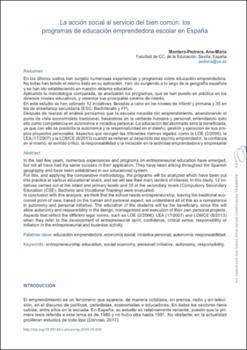La acción social al servicio del bien común: los programas de educación emprendedora escolar en España
Fecha
2018Resumen
En los últimos lustros han surgido numerosas experiencias y programas sobre educación emprendedora.
No todas han tenido el mismo éxito en su aplicación. Han ido surgiendo a lo largo de la geografía española
y se han ido estableciendo en nuestro sistema educativo.
Aplicando la metodología comparada, se analizarán los programas, que se han puesto en práctica en los
diversos niveles educativos, y veremos sus principales centros de interés.
En este estudio se han valorado 12 iniciativas, llevadas a cabo en los niveles de infantil y primaria y 35 en
los de enseñanza secundaria (ESO, Bachillerato y FP).
Después de realizar el análisis pensamos que la escuela necesita del emprendimiento, abandonando el
punto de vista economicista tradicional, basándose en la vertiente humana y personal, entendiendo todo
ello como competencia en autonomía e iniciativa personal. La educación del alumnado será la beneficiada,
ya que con ello se posibilita la autonomía y la responsabilidad en el diseño, gestión y ejecución de sus propios
proyectos personales. Aspectos que recogen las diferentes normas legales, como la LOE (2/2006), la
LEA (17/2007) y la LOMCE (8/2013) cuando se refieren al desarrollo del espíritu emprendedor, la confianza
en si mismo, el sentido crítico, la responsabilidad o la iniciación en la actividad emprendedora y empresarial In the last few years, numerous experiences and programs on entrepreneurial education have emerged,
but not all have had the same success in their application. They have been arising throughout the Spanish
geography and have been established in our educational system.
For this, and applying the comparative methodology, the programs will be analyzed which have been put
into practice at various educational levels, and we will see their main centers of interest. In this study, 12 initiatives
carried out at the infant and primary levels and 35 at the secondary levels (Compulsory Secondary
Education (CSE), Bachelor and Vocational Training) were evaluated.
In conclusion with this analysis, we think that the school needs entrepreneurship, leaving the traditional economist
point of view, based on the human and personal aspect, we understand all of this as a competence
in autonomy and personal initiative. The education of the students will be the beneficiary, since this will
allow autonomy and responsibility in the design, management and execution of their own personal projects.
Aspects that reflect the different legal norms, such as LOE (2/2006), LEA (17/2007) and LOMCE (8/2013)
when they refer to the development of entrepreneurial spirit, confidence, critical sense, responsibility or
initiation in the entrepreneurial and business activity.





